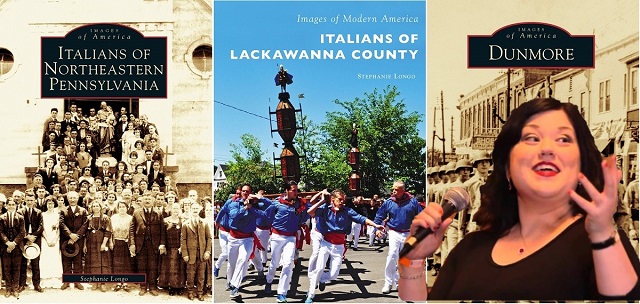 Interview by Tiziano Thomas Dossena
Interview by Tiziano Thomas Dossena
Italian-American historian Stephanie Longo has dedicated her life to celebrating and focusing on her family’s heritage. Born in Scranton, Pennsylvania, USA, she holds dual Italian citizenship and descends from the towns of Guardia Lombardi, Avellino Province, and Lamezia Terme, Catanzaro Province, Italy.
She holds a Bachelor of Arts degree in Italian and French from the University of Scranton, a Master of Arts degree in History, focusing on Italian-American studies, also from the University of Scranton, and a Master of Arts degree in Journalism from Regent University.
Ms. Longo is currently the associate producer and chief administrative officer of The Italian American Podcast and is an adjunct instructor in the history department at Lackawanna College in Scranton, PA.
L’Idea Magazine: You seem to be extremely proud of your heritage. What do you know about Guardia Lombardi? Have you ever visited that town? Are you working on any projects related to Guardia Lombardi?
Stephanie Longo: Guardia Lombardi has been a part of my life well before I ever set foot in Italy. My grandfather, the late Joseph Anthony Longo, was born there in 1916 but, unfortunately, died before he was able to return for a visit, which was a dream of his. He died eight years before I was born, so I never knew him. As a child, my first contact with Italy was via my mother, Ann Marie, telling me that all her father wanted to do was go back to Guardia. I distinctly remember her taking my finger to trace the map of Italy as a child, repeating, “This is Italy, my daddy was born there.” Just that act made me curious about my Italian heritage. When I enrolled at the University of Scranton as a French major, I had to pick up a second foreign language—there was no question that I would take Italian. I loved it so much that I decided to declare it as a second major. My mother and I finally made it to Guardia for the first time in 2005 and it was one of the most moving experiences of my life. We have been back since, but that first trip will always be etched in my mind—the emotion of seeing the house where my grandfather was born is something I still feel strongly even today. Getting to see the church (Santa Maria delle Grazie) where generations of my family worshipped helped me feel connected to my ancestors, knowing that they walked where I was walking. While the first trip over was surreal, subsequent trips were more of a homecoming. After that first trip, Guardia became mine. It’s still my ancestral town, but now it belongs to me, too. I am so grateful for that and cannot wait to return.
My grandmother, Anna, was born to immigrants to Scranton from Nicastro (now Lamezia Terme) in Catanzaro Province. My Nonna died when my mother was 10, so we didn’t have a lot of information about her family. While under COVID-19 lockdown, I made a strong effort to research as much as I could about Lamezia, joining groups on Facebook, and even finding distant relatives! I have not yet had the privilege of visiting Lamezia, but I am looking forward to it as soon as restrictions are lifted. I am sure I will have the same feelings I had when I first visited Guardia and I am sure that I will fall in love with Lamezia just as I have with Guardia.
Currently, I am working on a project focusing on Guardiese immigrants to northeastern Pennsylvania—my hometown of Dunmore has a predominantly large Guardiese population that I have studied extensively. I was able to collect a wide variety of images of these immigrants in their new lives here in the United States and am putting together a history of Guardia and this immigration to our area, including how traditions were preserved. I love discovering the stories of these people and am so proud that part of my ancestry comes from this town.
L’Idea Magazine: Stephanie, you are a historian and you focus on the Italian Americans of Northeastern Pennsylvania. How big and influential was and is this ethnic group in that area?
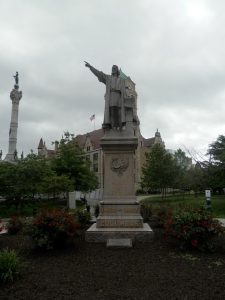
Stephanie Longo: According to the United States Census, there are 17.8 million Americans who claim Italian origin, with 1.4 million of those living in Pennsylvania. According to the Census Bureau’s American Community Survey, Lackawanna and Luzerne Counties take up five spots among the top 20 “Most Italian” towns in the United States, with Dunmore ranking highest (12th place). There is a vast array of opportunities to discover our area’s Italian culture. Among these opportunities are, of course, the region’s Italian restaurants, many of which have been recognized nationally for their quality and authenticity. One just needs to visit any of the area’s Italian enclaves, such as Carbondale, Dunmore, Jessup, and the “Pizza Capital of the World” Old Forge to sample these delicacies. Or one could stop at any of our region’s Italian specialty stores to purchase authentic products.
For people interested in history and culture, one just needs to take a walk around downtown Scranton’s Courthouse Square to see the works of world-renowned sculptor Frank Carlucci in his masterpieces that are our Columbus and George Washington statues, among others. Carlucci was known for creating the Grand Staircase at Ellis Island, where many immigrants to our great nation made their first steps in America. Or one could stop by the Ritz Theater and Performing Arts Center, which is one of only two theaters that remain in use that were originally founded by Sylvester Poli, an Italian immigrant without whom the modern cinema industry would not exist.
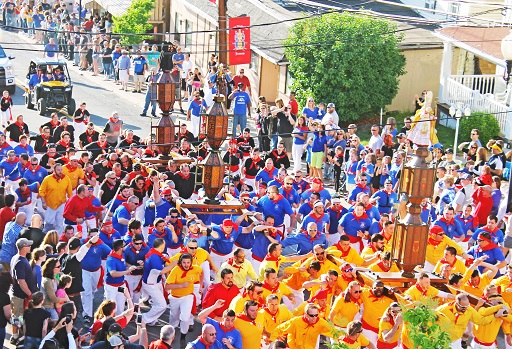
In Scranton’s West Side is the jewel that is the Church of St. Lucy, sculpted by Agostino Russo and where St. Francis Cabrini actually ministered during her life. A visit to St. Peter’s Cathedral and the Rotunda at Marywood University would provide the opportunity to view the artwork of Gonippo Raggi, whose works have been catalogued by the Smithsonian Institution.
And a visit to Jessup’s St. Ubaldo Cultural Center would make the perfect opportunity to discover more about La Corsa dei Ceri, widely considered to be the nation’s number-one representation of Central Italian American culture and history.
I strongly urge anyone who is interested in Italian American history and culture to visit Northeastern Pennsylvania, it’s truly a hidden treasure waiting to be discovered!

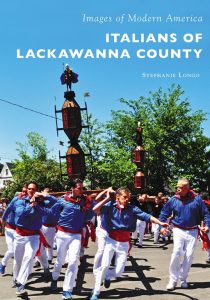 L’Idea Magazine: Your books, “Italians in Lackawanna County,” recognized with a Gold Award in the History category in the 2019 Nonfiction Book Awards, and “Italians in Northeastern Pennsylvania,” address specifically this ethnic group interaction with this area. Could you talk a bit about these two books?
L’Idea Magazine: Your books, “Italians in Lackawanna County,” recognized with a Gold Award in the History category in the 2019 Nonfiction Book Awards, and “Italians in Northeastern Pennsylvania,” address specifically this ethnic group interaction with this area. Could you talk a bit about these two books?
Stephanie Longo: “Italians of Northeastern Pennsylvania” examines the entire Northeastern Pennsylvania region and tells stories of Italian communities in Lackawanna and Luzerne Counties, as well as in areas such as Williamsport (Lycoming County). The book tells the story of the Italian immigrants who came to work in the coal and rail industries and contains older photos up until about the 1960s. “Italians of Lackawanna County” focuses exclusively on Lackawanna County’s Italian enclaves, such as Scranton, Dunmore, Jessup, and others. This book also picks up where “Italians of Northeastern Pennsylvania” leaves off and focuses on modern-day representations of Italian American culture in our area. I often tell people that “Italians of Lackawanna County” is the sequel to “Italians of Northeastern Pennsylvania,” because when you read both books, you get a full sense of just how important Italian heritage and culture is to this region.
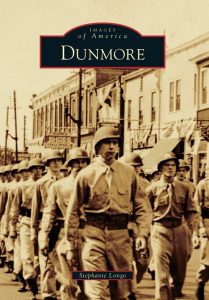 L’Idea Magazine: You also published a book about Dunmore, Pennsylvania, a suburb of Scranton. Could you tell us about that book? What motivated you to write it?
L’Idea Magazine: You also published a book about Dunmore, Pennsylvania, a suburb of Scranton. Could you tell us about that book? What motivated you to write it?
Stephanie Longo: My book on Dunmore coincided with the borough’s 150th anniversary in 2012. The main goal was to provide readers a pictorial history of our town. Every single person who has been fortunate enough to live in Dunmore bears a strong level of pride in our town—this book was not meant to be a full history of our town because no book can ever be considered a “complete” history, in my opinion. Rather, my idea was to share as many archival photos as possible so modern audiences could see familiar locales in other times and place themselves there, hopefully strengthening their bonds to our town. I also wanted to recall some legendary locals who people knew and loved who are still spoken of fondly to this day. My book on Dunmore is a fun glimpse into a small town that has a lot of heart.
L’Idea Magazine: You are presently the associate producer and chief administrative officer of The Italian American Podcast. What exactly are your duties for the Podcast?
Stephanie Longo: I genuinely have the best job in the world! Through my work with the Italian American Podcast, I am fortunate enough to live my passion every single day in a multitude of ways. In terms of the Podcast, I am responsible for developing and researching new show topics as well as coordinating episodes with the Podcast co-hosts. I also work extensively with the Italian American community at large on several of our initiatives, such as our #SupportItalianAmerican campaign, where we are seeking to promote Italian American businesses that need that extra boost during these difficult times. I also moderate the Podcast’s New Neighborhood group and work on developing and deploying new initiatives, all with the overall goal of bettering the Italian American community by creating more links between people. No two workdays are ever the same and I love that—I love that I am able to learn more about my own culture by being surrounded by so many people who are just as passionate about their heritage as I am. It truly is a blessing to work for such a wonderful company!
L’Idea Magazine: You also have a blog (https://irpiniastories.com/). What do you write about in the blog?
Stephanie Longo: Irpinia Stories is a passion project for me that began while I was working at a former employer. My heart has always been with Italy and I wanted to do something that kept that love alive since my day job did not have anything to do with Italy at all. Guardia Lombardi is in Irpinia, and as I studied the area more and more, I realized that a lot of Americans of Irpinian origin didn’t know much about the area. This blog is my way of teaching people about the culture and lifestyle of Irpinia, while showing its importance to Italy as a whole. Irpinia just marked the 40th anniversary of the 1980 Irpinia Earthquake, and the area is still rebuilding in many ways, even 40 years later. There is a tenacity in the Irpinian people that shows in how they handled the aftermath of the quake—this tenacity can be linked to the Irpinian diaspora, too. As immigrants, they had to fight to survive in their newly adopted land. And they did. This blog aims to unite the Irpinia of our ancestors with the Irpinia of today. I am really proud of my work and am always on the lookout for new topics!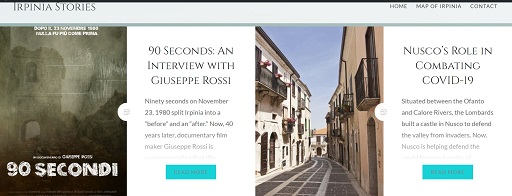
L’Idea Magazine: You are an adjunct professor at Lackawanna College in Scranton. Do you also teach about Italian Americans in that college?
Stephanie Longo: I enjoy my role as an adjunct at Lackawanna College because I am able to help students gain a deeper understanding of American History and how the past affects our present lives. I do not teach an Italian American history class per se, but I am lucky to be able to discuss Italian American topics when they come up. I’ve seen my students’ surprise when they learned about the 1891 New Orleans Lynching where 11 Italians were murdered and how that was the largest mass lynching in American history. I’ve been able to tell them about Philip Mazzei’s role in the founding of our country. I’ve even been able to help correct some of the false narratives surrounding Christopher Columbus via class discussions by pointing students to primary sources debunking modern theories. I always try to give my students more information so that they can make their own decisions about what happened or might have happened in American history. It is always an honor when they message me privately asking for more resources to learn more about any historic topic.
L’Idea Magazine: You are an award-winning journalist, the former editor of The Villager newspaper (Moscow, PA) and The Abington Suburban (Clarks Summit, PA), as well as a former correspondent for Go Lackawanna (Scranton, PA). What did you write about in these roles?
Stephanie Longo: My work in community journalism was very fulfilling to me because I had the opportunity to actively participate in the life of the communities I served. Whether I was writing about the developments at a school board meeting or plans for an upcoming annual ice festival, my articles served as a lens through which people were able to discover what made those communities tick. I thoroughly loved my time in community journalism. I got to know members of the communities I served who then became friends. I was also able to participate in many community activities, which cemented those communities becoming a part of me, too. It was an honor and a privilege to serve.
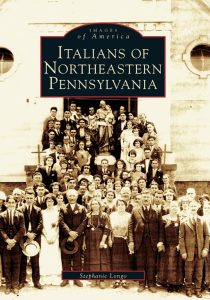 L’Idea Magazine: Which one is the award that you received that touched you more, emotionally?
L’Idea Magazine: Which one is the award that you received that touched you more, emotionally?
Stephanie Longo: My first visit to Guardia Lombardi was shortly after “Italians of Northeastern Pennsylvania” was published. By this time, I had been in touch with the town, especially with the town’s historian, the late Salvatore Boniello, for my BA thesis and had remained in regular contact with everyone. When I wrote that I was coming in 2005, Signor Boniello asked if I would be interested in giving a presentation at the local school, which I gladly accepted. I had no idea that during this event, they would present a plaque to me, naming me an honorary citizen of Guardia Lombardi. I can’t properly explain what this gesture meant to me. It was as if everything came full circle for my family—to see town documents where ancestors had to sign their names with an “x” because they couldn’t read or write and to be that descendant who came back as a writer of their history was deeply moving and such an honor. I wouldn’t be where I am today if it wasn’t for them. Everything I do is in their memory.
L’Idea Magazine: Your roots as an Italian have obviously influenced your career choices. How much did they influence all the other aspects of your life?
Stephanie Longo: My heritage is everything to me—it influences how I relate to the world around me. It influences my actions and my choices. It influences how I treat others and how I would like to be treated as well. It’s always there. It’s my North Star, guiding me through my days and encouraging me to do better, to be better. I couldn’t be more proud to have been given something so precious as this.
L’Idea Magazine: What do you think is our responsibility as writers in this tragic period of forced quarantine for the nation?
Stephanie Longo: A writer is someone who observes the world and describes it through the lens of his or her experience. Our responsibility in this incredibly difficult time is to describe our thoughts and feelings as they happened, without fear of being judged. How we handle this time is up to the individual— some people are using it to learn new things, while others are just trying to make it through this overwhelming situation. There are no right or wrong answers as to how we should live this moment in history—the only thing we can truly do is live our lives as best as we can, knowing that this moment will pass.
L’Idea Magazine: If you had the opportunity to meet a character from any historical period, who would he or she be and what would you like to ask them?
Stephanie Longo: I genuinely can’t choose! I would want to meet my ancestors from both my Campanian and Calabrese sides. I never knew my maternal grandparents, so I would give anything to be able to sit down and talk with them. There are so many questions I would ask my ancestors that I could probably fill a book! I would love to understand their motivations for coming to the United States and their feelings about leaving Italy and creating a new life here. I would also love to convey to them how thankful I am for the sacrifices they made for me because, without their courage in leaving everything they ever knew, I would not be fortunate enough to live the life I have today.
L’Idea Magazine: A message for our readers?
Stephanie Longo: When you find something you are passionate about, you need to do whatever you can to keep that passion alive. I discovered my passion for my heritage at a young age and it has grown with me as I’ve gotten older. It’s to the point where this passion goes beyond anything I could properly explain. Being able to devote my professional life to something I love so much is a dream come true, as there are many people out there who, for whatever reason, were unable to follow their passion. I’ve found that when you put what you truly love doing front and center in your life, opportunities come and you end up in a place where every day is filled with joy. I hope everyone reading this is inspired to really sit down and examine what they are truly passionate about and then take the steps necessary to bring that passion to life in their daily lives.


